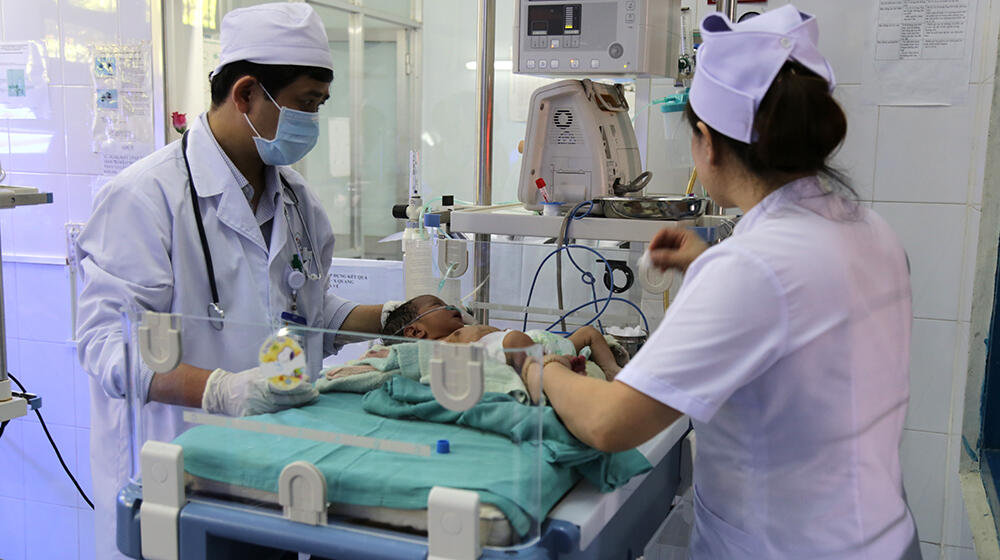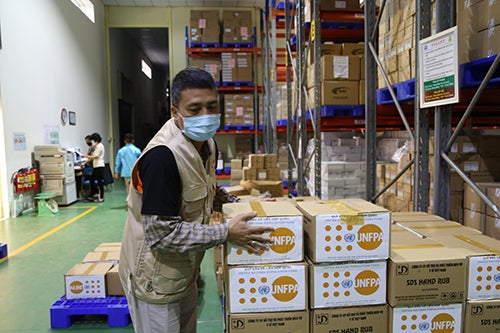
HA NOI, Viet Nam – Health experts in Viet Nam are calling for efforts to ensure continuous access to maternal health care amid the growing COVID-19 pandemic. More than 260 cases of COVID-19 have been confirmed in the country, mostly in and around Ha Noi City.
“Special medical services and care should be provided for pregnant women, mothers during and after delivery, and newborns amid the epidemic,” said Nguyen Duc Vinh, director of the Ministry of Health’s department for maternal and child health care. “We have to well prepare and sustain human resources ready providing all sexual and reproductive health, maternal and child health services amid the COVID-19 epidemic.”
UNFPA is working with the government and partners to ensure health workers can safely continue to provide these services. On 3 April, UNFPA delivered supplies including 7,000 bottles of sanitizers, to the health ministry’s Department of Planning and Finance.
Health officials will make the supplies available to prioritized maternal and reproductive health facilities in Ha Noi, including the National Gynaecology and Obstetrics Hospital, the Ha Noi Obstetrics and Gynaecology Hospital, as well as other maternity wards and selected facilities offering sexual and reproductive health services.
Born in a pandemic
The first COVID-19 cases in Viet Nam were reported in late January, but the health system has been proactive in containing the epidemic with contact tracing, testing and isolation measures. Social distancing protocols have been implemented, with non-essential businesses closed and public transport suspended.

A recent uptick in cases has been largely associated with medical facilities, highlighting the importance of infection-control measures, including hand-washing and disinfection.
UNFPA is urgently working to ensure maternal health services remain accessible to pregnant and post-partum women. An estimated 4,300 women give birth every day in the country.
To ensure speedy delivery, UNFPA procured the sanitizer products from the local market on a priority basis.
Even in normal times, without the threat of a pandemic looming over maternity wards, infection is a serious concern during and after childbirth. In fact, infection is one of the leading causes of maternal mortality globally.
Infection control protocols are all the more critical now that health workers are concerned about the spread of COVID-19. Front-line health workers are particularly at risk of being exposed to the virus.
“The risk of being infected with SARS-COV-2 amongst health workers is very high,” said Mr. Nguyen, referring to the scientific name for the virus that causes COVID-19.
“If a surge of COVID-19 occurs, we may be at risk of severe shortage of skilled human resources, equipment and supplies, particularly personal protective equipment to deliver normal and complication maternal and neonatal services,” he added.
Supporting health workers, new mothers
“It is imperative that we support the Ministry of Health and all the heroes of this country today – all the people working in the health sector, especially the front liners, who risk their health and safety for people in responding to this emergency,” said Naomi Kitahara, UNFPA’s representative in Viet Nam, “The protection of health workers must be a top priority during the COVID-19 epidemic response.”
In addition, pregnant women with respiratory illnesses must be treated with utmost priority due to increased risk of adverse outcomes, UNFPA advises.
“We would like to express our solidarity with all Vietnamese people as we face the COVID-19 epidemic together. Alongside all UN agencies, UNFPA stands ready to provide any assistance we can to support the national response to the epidemic, paying particular attention to vulnerable groups such as pregnant women,” said Ms. Kitahara.

